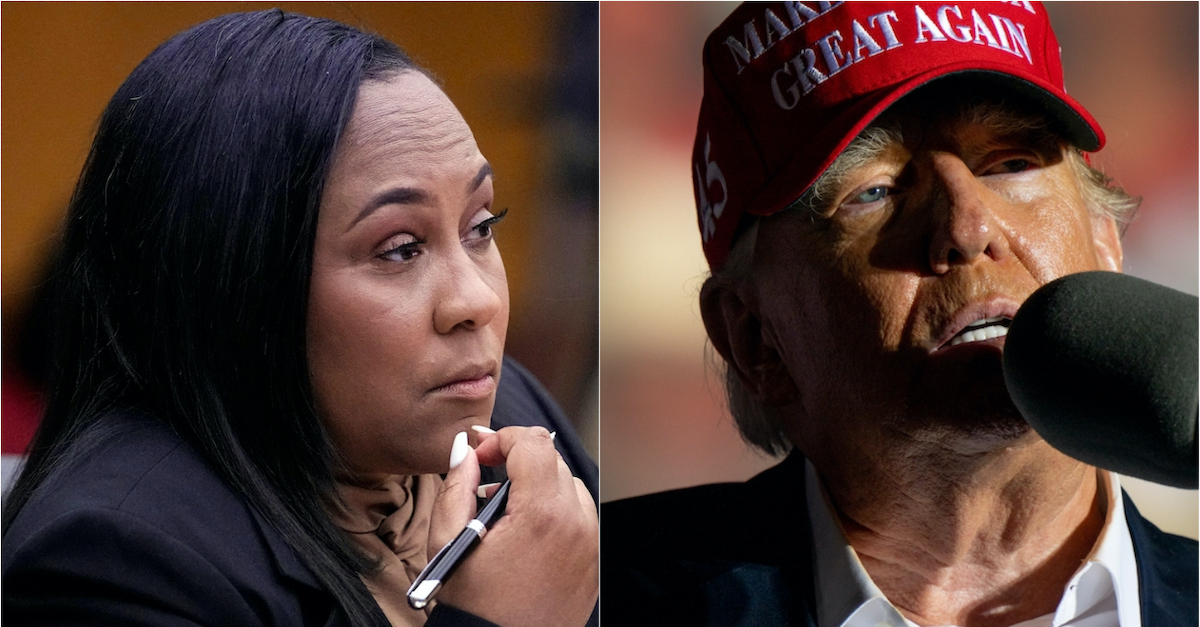
Fulton County District Attorney Fani Willis and former President Donald Trump (Willis via AP Photo/John Bazemore, File; Trump via Brandon Bell/Getty Images)
A special grand jury investigating former President Donald Trump’s attempts to overturn the 2020 election results in Georgia recommended the district attorney issue “appropriate indictments,” according to portions of its report released on Thursday.
“A majority of the Grand Jury believes that perjury may have been committed by one or more witnesses testifying before it,” one unredacted passage states. “The Grand Jury recommends that the District Attorney seek appropriate indictments for such crimes where the evidence is compelling.”
It is unclear whom they recommend charging. Other parts of the filing suggest that the recommended charges extend much further than perjury.
“We set forth for the Court our recommendations on indictments and relevant statutes, including their votes by the Grand Jurors,” the introduction states. “This includes the votes respective to each topic, indicated in a ‘Yea/Nay/Abstain’ format throughout. The total number of Grand Jurors who placed a vote on each topic has been indicated in each section. Footnotes have been added in certain places where a juror requested the opportunity to clarify their vote for any reason.”
Still substantially redacted, the released passages of the report include the introduction, the conclusion, and a section detailing concerns that “some witnesses may have lied under oath during their testimony.” The 26-person panel heard from numerous witnesses over the course of an investigation that stretched for roughly half a year, between May 2, 2022, and December 2022.
“The Grand Jury received evidence from or involving 75 witnesses during the course of this investigation, the overwhelming majority of which information was delivered in person under oath,” the introduction to the special grand jury report states. “The Grand Jury also received information in the form of investigator testimony and various forms of digital and physical media.”
The panel also resoundingly rejects Trump’s claims of pervasive fraud in the 2020 election.
“The Grand Jury heard extensive testimony on the subject of alleged election fraud from poll workers, investigators, technical experts, and State of Georgia employees and officials, as well as from persons still claiming that such fraud took place,” the report says. “We find by a unanimous vote that no widespread fraud took place in the Georgia 2020 presidential election that could result in overturning that election.”
The special grand jury, comprised of dozens of Fulton County residents, noted that they are a panel of laypeople, and their recommendations should not be construed as comprehensive.
“If this report fails to include any potential violations of referenced statutes that were shown in the investigation, we acknowledge the discretion of the District Attorney to seek indictments where she finds sufficient cause,” the report says. “Furthermore, this Grand Jury contained no election law experts or criminal lawyers. The majority of this Grand Jury used their collective best efforts, however, to attend every session, listen to every witness, and attempt to understand the facts as presented and the laws as explained.”
Earlier this week, Superior Court Judge Robert McBurney indicated that the full report includes a roster showing the special grand jury’s recommendations about whom to indict for what alleged crimes. That list will remain sealed until Fulton County District Attorney Fani Willis makes her final charging decisions, through a separate grand jury.
By design, a special grand jury cannot issue indictments, only issue recommendations in a public report. Judge McBurney indicated that the full report eventually will be made public.
Following this partial release, Willis must update McBurney on the progress of her investigation in order to assess what will be released in the future.
“Finally, the Court directs the District Attorney’s Office to provide periodic updates on the progress of its investigation so that the Court can reassess if other parts of the special purpose grand jury’s final report can properly be disclosed,” McBurney wrote on Feb. 13.
After losing the 2020 election, Trump tried to overturn his defeats in key states across the country — with a particular focus on Georgia. In the Peach State, Trump made an infamous phone call urging Georgia Secretary of State Brad Raffensperger (R) to “find 11,780 votes” — the precise total needed to reverse President Joe Biden’s victory there — or potentially face criminal exposure.
Citing Willis retaining the services of private Atlanta lawyer John Floyd, some legal observers believe the DA may be preparing to bring charges under the state’s anti-racketeering law. Floyd specializes in those cases, and the Brookings Institution, a Washington, D.C.-based think tank, issued a report opining that Trump’s conduct fits within what the statute was meant to punish.
“While the term ‘RICO’ conjures up prosecutions of Mafia bosses, the statute is much broader than that,” Brookings noted in a report. “It recognizes that if violations of individual criminal statutes by a single person are bad, an enterprise that repeatedly violates the law is worse and should be subject to additional sanction.”
Some legal experts believe such a charging decision would create a more difficult case to prosecute, but supporters of that approach argue that it would allow the government to attack a sprawling, multi-faceted attempt to subvert Georgia’s elections. The grand jury heard from dozens of witnesses over the course of the months-long investigation, including the fake electors asked to falsely certify that they were legitimately appointed to represent Trump in a state where he lost. Certain witnesses, like Rudy Giuliani and Sen. Lindsey Graham (R-S.C.), testified only after losing protracted subpoena battles.
Read the released passages of the report below: